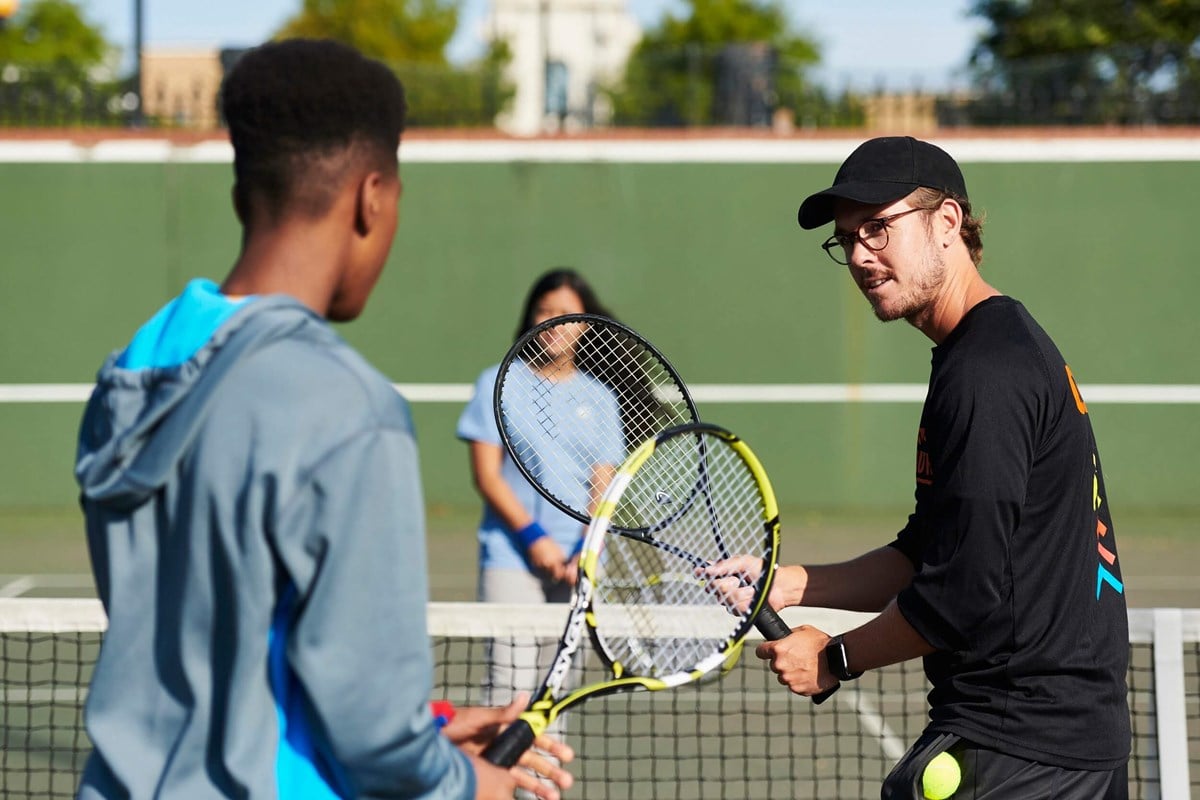
Developing inspirational tennis coaches – how the LTA Instructor course and the coaching pathway are raising the standards of coaches in Britain
• 4 MINUTE READ
Our coaching pathway has been revamped and modernised in recent years and it’s now serving up candidates that are raising standards of instruction on courts across Britain.
Former British Ladies' tennis champion Jo Ward (Head of Coach Education & Qualifications) and Merlin Van de Braam (LTA’s Head of Coach Development and Support) have spearheaded some exciting evolutions within formal LTA Qualifications over the last two years, with an ambition to drive up standards at all levels of coaching.
This work sits as part of our Coach Development Plan, which aims to create inspirational coaches who can grow the game and the first two levels have attracted growing numbers signing up for the courses, with 3,395 new candidates signing up for courses last year.
The LTA Assistant Course (Level 1) is ideal for tennis parents, enthusiasts or keen players looking for the knowledge and skills to support group coaching sessions, alongside a lead coach.
The next phase of the coaching pathway, the LTA Instructor (Level 2) course, is a five-day qualification (split into four core and one elective day), with enhanced online learning that is directly relevant to your coaching career. Coaches get access to tactical development content, and technical development tools, as well as being introduced to fundamental coaching frameworks to ensure they are ready to run quality group-based coaching.
With video-based coursework tasks at the heart of the qualification, the five-day course is complemented by online learning on the informative LTA Learn platform and a final video exam that we assess centrally to ensure pass standards are consistent and maintained at a high level wherever you take the course.
Here, Ward and Van de Braam outline the vision for the LTA Instructor course, which continues to evolve in this exciting period in LTA coach education.

What can candidates expect on the LTA Instructor course?
JW: The course opens with an expert LTA Tutor showcasing an example of what a great lesson looks like, as well as the coaching methods that sit behind great coaching. I am a firm believer that our Tutors, who are all excellent coaches, should begin the course by showing the trainee Instructors what good looks like to set the scene and standard for the rest of the course.
In addition, assessments have been centralized for standardisation nationwide, and trainee Instructors and Coaches now undertake assessments in their own clubs with their own players, which are submitted via video. This removes the need for travel and more time away from work, and it also means that coaches can refine their coaching over the course of multiple videos before selecting and submitting one that meets the required standard to pass.
We listened to head coaches and asked them what they needed from those working with them on court, and we spoke to employers of coaches to ensure we develop courses and products that serve the needs of the industry.
Why was there a need to revamp the LTA coaching courses?
MVB: We conducted an independent external review to look at what was good, where we could improve and what were the key challenges moving forward within coach education.
We listened to head coaches and asked them what they needed from those working with them on court, and we spoke to employers of coaches to ensure we develop courses and products that serve the needs of the industry. That insight told us that we needed the equivalent of a group exercise instructor for tennis. We also saw that 68 per-cent of employers said it was too easy to pass Levels 1 and 2 and the standard of coach entering the industry was simply not good enough. There was a real perception that you could just turn up to the course, fill in the forms and you would get through fine. The course did not prepare you for the demands of the role in the industry, so we needed to change that.

There is a big focus on the digital element of this course. Why is that important for a modern coach?
JW: There are two reasons for including a strong digital element. Firstly, digital skills are key tools that modern coaches will use in their coaching, promotions, programme planning and management. These skills are learned and augmented across the many tasks that learners will do on the course.
Secondly, by housing a lot of the knowledge-building activities online, the course can prioritize the skill-building work for the face-to-face days. Both are equally important for coaches, and by splitting the content in this way a significant proportion of the course can be done at home, without travel, and in the learners’ own time. This makes the course as accessible as possible, whilst still driving up quality.
The final part of the triad, to complement knowledge and skills, is the practical application gained through the eight hours of qualification experience built into the course.
What are the primary targets for our revamped coaching courses?
MVB: Our overall ambition is to develop inspirational coaches that can grow the game. A more rigorous LTA Instructor (Level 2) is a great opportunity to drive up standards in our coaching pool but also be more relevant to the demands of the industry. The team have introduced a readiness test that is crucial to the process. We are now hearing consistent feedback that this is the best thing we could have done because it results in skillful, trained professionals who have a sound grasp of the game from a technical and tactical perspective. This is critical if we are to have a respected coaching profession.
2022 saw an uplift in female coach numbers at Assistant, and we are continuing with this drive into 2023.

Are we aiming to attract more female coaching talent into the system?
JW: We have strategic grant funding, distributed through our Coach Development Centre (CDC) network, with the specific aim of increasing the numbers of female coaches entering the pathway at Assistant. CDCs have agreed objectives to increase female learner numbers, and they have the flexibility to decide how to utilise the grant funding across their jurisdictions.
For example, some have concentrated on marketing and promotion directly to potential female candidates, whilst others have underwritten courses to provide discounts. 2022 saw an uplift in female coach numbers at Assistant, and we are continuing with this drive into 2023.
How have demands on a tennis coach changed in recent years?
MVB: The role of a coach in the modern era is exciting, challenging and more varied than ever. You need skills in everything from tactical development to business development. The skills you need to operate safely and competently have expanded so much in recent years and we are simply adapting to that. As an example, you can't have a coach without any digital skills or any knowledge of safeguarding and athlete welfare; this is not acceptable by today’s standards. The bar has been raised and I'm very proud of the advances our pathway has made to react to that. The LTA Instructor course is more challenging to pass and we make no apologies for that.
Become a tennis coach
Find out more about our coaching pathway and how to kick-start your journey in becoming a tennis coach.





